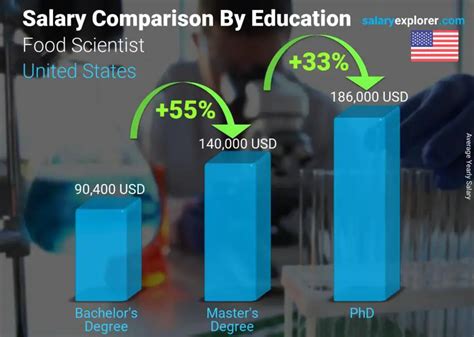Are you considering a career in the food science industry? Do you want to know more about the potential salary and compensation you could receive in this field? In this blog post, we will explore the various factors that influence food scientist salaries, from education requirements and experience levels to location and job titles. By understanding these factors, you can gain insights into how to maximize your earning potential in the food industry. Whether you’re just starting your career or looking to advance to higher-paying roles, we’ll discuss the specializations, benefits, and career progression opportunities that can help you achieve your salary goals as a food scientist. By the end of this post, you’ll have a comprehensive understanding of food scientist salaries and what it takes to succeed in this rewarding and lucrative industry. So, let’s dive in and uncover the intricacies of compensation in the food science field.
Table of Contents
Defining food scientist salaries
Food scientist salaries can vary widely depending on a number of factors. The salary range for food scientists can be influenced by education, experience, specialization, and location.
Education plays a significant role in determining a food scientist’s salary. Those with advanced degrees, such as a master’s or Ph.D. in food science, tend to command higher salaries compared to those with only a bachelor’s degree. Higher education typically equates to higher earning potential in this field.
Another key factor that influences food scientist salaries is experience levels. Entry-level positions will naturally have lower salaries compared to mid-level or senior-level positions. Individuals with several years of experience in the industry can expect to earn more than those who are just starting out in their careers.
Specializations within the food industry can also affect salaries. For example, food scientists who specialize in food safety or sensory evaluation may command higher salaries than those with a more general focus. The more specialized the skill set, the more valuable the employee may be to a company, and this can translate to a higher salary.
Finally, location can play a significant role in determining a food scientist’s salary. Salaries for food scientists can vary widely depending on the region and the cost of living in that area. For example, food scientists working in urban areas with higher costs of living may command higher salaries than those in rural areas.
Factors influencing food scientist salaries
When it comes to food scientist salaries, there are several key factors that can greatly influence how much a professional in this field can earn. One of the most significant factors is the level of education and degree attainment. Typically, individuals with higher levels of education, such as a master’s or Ph.D., tend to command higher salaries due to their specialized knowledge and skill set.
Another important factor is the amount of experience a food scientist has. Those with several years of experience in the industry are often able to negotiate higher salaries, as they bring valuable expertise and a proven track record of success to the table.
Specializations within the food industry also play a role in determining salaries. For example, food scientists who specialize in product development or food safety may be able to command higher salaries due to the specialized nature of their work and the demand for their expertise in the industry.
Finally, location can also have a significant impact on food scientist salaries. Professionals working in major metropolitan areas or regions with a high demand for food scientists may be able to command higher salaries compared to those working in more rural areas with a lower demand for their skills.
Education requirements for higher compensation in food science
When it comes to pursuing a career in food science, the level of education can greatly impact the compensation you receive. Higher education in the form of advanced degrees such as a master’s or a Ph.D. can lead to higher earning potential in this field. Many employers in the food industry highly value candidates with advanced degrees, as it demonstrates a deeper level of knowledge and expertise in food science.
Furthermore, specialized certifications and courses in areas such as food safety, quality assurance, and regulatory compliance can also contribute to higher compensation. Employers often seek out candidates who possess these additional qualifications as it shows a commitment to ongoing professional development and a broader skill set.
On the flip side, candidates with only a bachelor’s degree may find themselves with limited opportunities for career advancement and lower compensation compared to their counterparts with advanced degrees. While a bachelor’s degree can provide a solid foundation in food science, those looking to maximize their earning potential should strongly consider pursuing further education to set themselves apart in the job market.
Overall, the level of education and additional qualifications play a significant role in determining compensation in the field of food science. As the industry continues to evolve and demand for highly skilled professionals grows, investing in continuing education and advanced degrees can be a valuable step towards achieving higher compensation and career success.
Experience levels and their impact on food scientist salaries
When it comes to the salaries of food scientists, experience levels play a significant role. As with many professions, the more experience one has, the higher their earning potential. This is especially true in the field of food science, where hands-on experience and knowledge can greatly impact a scientist’s value to an employer.
At the entry level, food scientists with little to no experience can expect lower salaries compared to their more experienced counterparts. As they gain more experience and demonstrate their abilities in the industry, their earning potential tends to increase.
Food scientists with mid-level experience may have the opportunity to take on more challenging roles and responsibilities, which can in turn lead to higher salaries. Additionally, those with several years of experience under their belts are often sought after by companies willing to compensate them accordingly for their expertise.
For senior-level food scientists who have spent years honing their skills and knowledge in the industry, the impact on their salaries can be substantial. These individuals often have the opportunity to command top-tier salaries, as their experience and track record of success make them valuable assets to potential employers.
Specializations that command higher salaries in the food industry
When it comes to food science, there are certain specializations that can lead to higher salaries in the industry. One of the specializations that commands a higher salary is food engineering. Food engineers are responsible for designing and improving food and beverage processing techniques, as well as developing new products. Their unique skillset and expertise in the field makes them highly sought after, leading to higher compensation.
Another specialization that can lead to higher salaries in the food industry is food microbiology. Food microbiologists are experts in the study of microorganisms in food and how they affect its safety and quality. Their role is vital in ensuring the safety of food products, and their specialized knowledge can result in higher pay.
Additionally, food chemists are another specialization that can command higher salaries in the industry. Food chemists are involved in developing and improving food products, as well as ensuring their safety and quality. Their expertise in the chemical composition of food and how it affects its properties can lead to higher compensation in the field.
Lastly, food packaging engineering is a specialization that can result in higher salaries in the food industry. Food packaging engineers are responsible for designing and creating packaging solutions for food products, with a focus on safety, quality, and sustainability. Their specialized skills and knowledge in this area can lead to higher earning potential.
Comparing salaries of food scientists in different sectors
When it comes to food scientist salaries, the industry and sector in which the professional is working can have a significant impact. One of the key factors that influence food scientist salaries is the type of sector in which they are employed. For example, a food scientist working in the government sector may have different earning potential compared to one working in the private sector.
Another important aspect to consider when comparing salaries of food scientists in different sectors is the scope of work and responsibilities. Those working in research and development, for instance, may command a higher salary than those in quality control or regulatory affairs. Additionally, those employed in the manufacturing sector may have different salary structures compared to those working in the retail or hospitality sector.
Food scientists working in different sectors may also have varying opportunities for career growth and advancement, which can also impact their earning potential. For example, those in the pharmaceutical sector or food technology companies may have access to more resources and opportunities for professional development, which may translate to higher salaries in the long run. On the other hand, those working in academic or government research institutions may have a different set of opportunities and compensation structures.
Overall, when comparing salaries of food scientists in different sectors, it’s important to consider not just the monetary compensation, but also the potential for career growth, work-life balance, and the overall job satisfaction that comes with working in a particular sector within the food science industry.
How location affects food scientist salaries
When it comes to food scientist salaries, one of the biggest factors that can influence the pay scale is the location of the job. Different cities and regions have varying costs of living and demand for food science professionals, which can directly impact the salaries offered.
For example, urban areas with high living costs and a thriving food industry may offer higher salaries to attract and retain talent. On the other hand, rural areas with lower costs of living and less competition for skilled workers may offer lower salaries. Additionally, certain regions may have a greater need for food scientists due to the presence of agriculture or food processing facilities, which can drive up the demand and salaries for professionals in this field.
Furthermore, location can also impact the opportunities for career advancement and professional development. Food scientists working in major cities or regions with a strong food industry may have access to more networking opportunities, industry events, and research facilities, which can contribute to their overall career growth and potential for salary increases.
It’s important for food scientists to consider the impact of location on their salaries and career prospects when exploring job opportunities and negotiating offers. Understanding the regional differences in pay and demand can help professionals make informed decisions about their career paths and maximize their earning potential in the food science industry.
The relationship between job titles and compensation in food science
When it comes to the relationship between job titles and compensation in the field of food science, there are various factors that come into play. Job titles within the food science industry can vary greatly, ranging from entry-level positions such as food technologist or food lab assistant to higher-level roles such as research and development director or quality assurance manager. Each of these job titles carries with it a different level of responsibility and expertise, which in turn impacts the compensation offered.
For example, individuals with more specialized job titles, such as flavor chemists or food safety consultants, often command higher salaries due to their unique skill set and expertise in their respective fields. On the other hand, entry-level or more general job titles may offer lower compensation as they require less experience and specialization. Therefore, the specific job title that an individual holds within the food science industry can have a significant impact on their overall compensation.
In addition to job titles, the level of experience a professional has within the field of food science also plays a crucial role in determining compensation. Individuals with several years of experience in senior-level positions such as food research and development manager or food safety director are likely to receive higher compensation compared to those in entry-level roles. This is due to the knowledge and expertise that comes with years of experience, making these individuals more valuable to employers and thus justifying a higher salary.
It is also important to consider the location in which a food scientist is employed, as this can impact compensation as well. For example, food scientists working in urban areas or regions with a high cost of living may receive higher compensation compared to those working in rural areas. Similarly, individuals working for larger food companies or organizations may receive greater compensation compared to those employed by smaller companies.
Benefits and perks offered to food scientists
Food scientists are often highly sought after professionals in the food industry, and with that comes a variety of benefits and perks that are offered to them. These benefits and perks are designed to attract top talent to the industry and to retain experienced professionals. From healthcare benefits to flexible work schedules, food scientists often enjoy a range of perks that contribute to their overall job satisfaction and work-life balance.
One of the most common benefits offered to food scientists is healthcare coverage. Many employers provide comprehensive medical, dental, and vision insurance to their employees, including food scientists. This allows them to access quality healthcare and ensure their well-being while working in a demanding profession.
Additionally, many food scientists have the opportunity to participate in retirement savings plans, such as 401(k) programs. These plans allow them to save for their future and provide financial security beyond their working years. Employers may also offer other financial benefits, such as life insurance and disability coverage, to help protect their employees and their families.
Aside from traditional benefits, food scientists may also receive perks that support their work-life balance. These can include flexible work schedules, remote work opportunities, and paid time off. This allows food scientists to better balance their personal and professional lives, leading to increased job satisfaction and reduced burnout.
Career progression and salary growth in food science
When considering a career in food science, it’s important to understand the potential for advancement and salary growth within the field. As with any profession, the path to career progression and increased compensation in food science is influenced by a variety of factors.
One of the primary drivers of career progression and salary growth in food science is education. Food scientists with advanced degrees, such as a master’s or PhD, may be eligible for higher-paying positions and opportunities for leadership roles within companies.
Experience levels also play a significant role in salary growth. With each year of experience, food scientists may be eligible for promotions, raises, and additional responsibilities, all of which can contribute to an increase in compensation.
Additionally, specialized skills and expertise within a particular area of food science can command higher salaries and career advancement opportunities. Those who specialize in areas such as product development, food safety, or quality control may have access to more lucrative positions within the industry.





